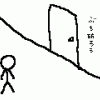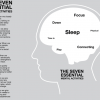After being treated with adderall for ADHD for nearly 2 years, my psychiatrist agreed to let me try selegiline. The rebound effects of adderall became unberable, even at 5mg doses (I resisted going up in dosing) the withdrawl symptoms made my ADHD indistinguishable from depression. It took 2 weeks for the rebound effects to subside, at which time I began treatment with 5mg/day (oral) selegiline. The effects were noticeable within the same day. The first few days I felt a wonderful dopamine high, the "high" feeling went away but I've still never felt more "normal" in the last ~7 years. Feelings of anxiety, depression, anhedonia, and even the ADHD-related lack of motivation/concentration have all gone away. Even muscle reflexivity is noticeably restored when playing sports.
For those wondering why selegiline may be ideal for ADD/ADHD, I would surmise that the MAO-B inhibitor allows dopamine to build up to it's appropriate levels, and dopamine is a precursor to norepinephrine and epinephrine (http://en.wikipedia.org/wiki/Dopamine) so the necessary "feelings of motivation" are restored. In fact, I would insist that things like selegiline be a first-line treatment for ADD/ADHD rather than stimulants (see http://biopsychiatry.com and www.selegiline.com) but I fear it will take a long time for conventional psychiatry to change, which I think is being heavily influenced by the interests of pharmaceutical companies rather than real health benefits or treatments that save patients money in the long term. The risks of taking an MAO-B inhibitor like selegiline have proven mostly nonexistent, at least while the dosing is kept at MAO-B selective levels. That said, I look forward to trying rasagiline when it goes off-patent this coming February. The only negative side effect I report for selegiline is the vasoconstrictive feeling associated with the l-methamphetamine metabolite, but that seems to be going away as I continue dosing.
Adderall acts by directly stimulating the release of dopamine and norepinephrine while inhibiting their reuptake. I've noticed that medications acting on norepinephrine (like Atomoxetine) often have some nasty side effects like depression or decreased libido. I further believe stimulants and most "scheduled" medications have limited long-term usability. That said, adderall was the ultimate productivity pill, known as "go-pills" in the military, the legendary mathematician Paul Erdos attests to its use. Ultimately, I think social-behavioral problems in our society have promoted the use of stimulants like adderall rather than medical conditions like ADHD. I have little interest in trying the racetams after using adderall. I tried Huperzine-A which had roughly 1/20th the feeling of adderall, and like adderall it left me in a negative mental state once it left my system. The negative mental state was remedied with tianeptine (see below).
After establishing a 1.3 week baseline of selegiline, I decided to try tianeptine after reading www.tianeptine.com. The onset was so smooth it was barely noticeable, I felt both stimulated and relaxed after ~30 minutes, during which time I was very productive. After roughly 4-6 hours, I noticed feelings of absolute excitement at just the thought of some completed goals. No ill side effects were noticed. I hypothesize that reports of drowsiness or sleepiness are due to tianeptine also enhancing the reuptake of melatonin. Prior to using selegiline I had a severely disrupted sleep pattern which did not normalize while on selegiline. After using tianeptine just one time I actually felt tired at the onset of darkness later that day, which was a major breakthough for my sleep pattern. I do not recommend taking tianeptine before going to bed though, the stimulant effect makes it difficult to sleep when your thoughts make you "elated". Furthermore, I would recommend only taking tianeptine as-needed, that is, when feeling the effects of stress, sadness, or depression. I feel no effect whatsoever after taking tianeptine when I already feel perfectly fine. The absence of tianeptine in the American markets seems to illustrate flawed concepts of drug control and pharmaceutical development in the US.
My physiology:
I'm a 27 year old white male with a reasonably high metabolism, and I traditionally respond well to low-dose medicines.






















































